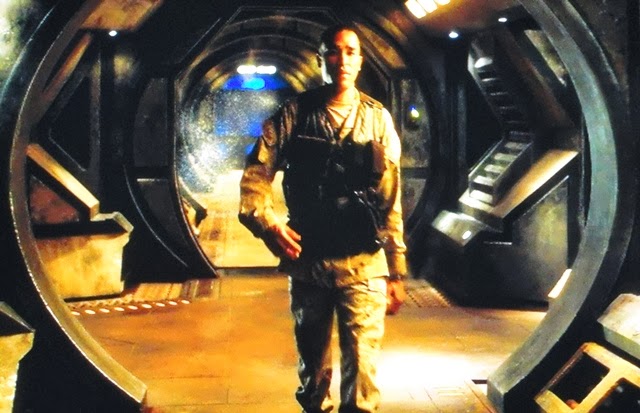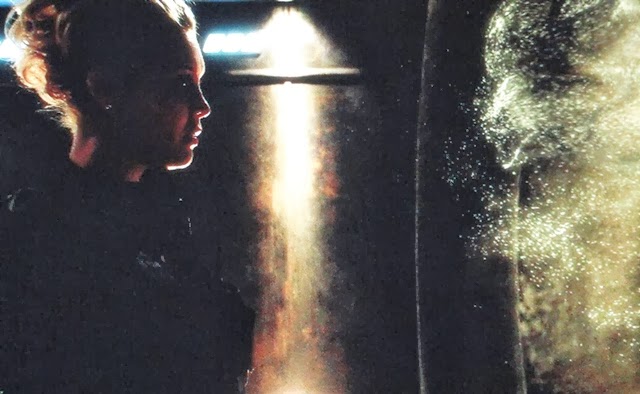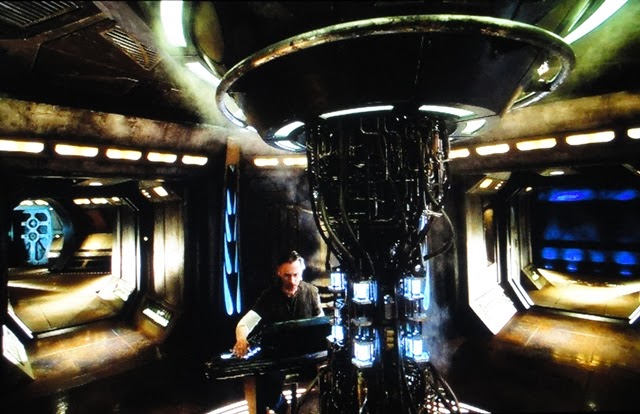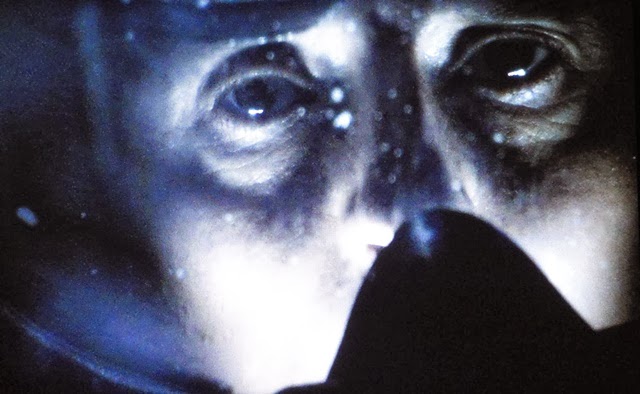"It looks like we entered the Hoth system. Empire Strikes Back. Second Star Wars movie. Okay, I refuse to call it Episode Five."
-Eli Wallace always there with just the right amount of humor and referencing pop culture like John Crichton. Crichton would be proud.-
"Everyone is lying."
-Eli-
"Yeah, grownups do that sometimes."
-Dr. Nicholas Rush underscoring that with lies comes the question of intent for the characters of Stargate Universe-
"Damn he's a lot of work."
-Everett Young on his familiar refrain regarding Rush-
"Always consider the greater good - that's it."
-Dr. Nicholas Rush to Tamara Johansen-
"This is beautiful out here."
-Everett Young capturing the essence of a show that brings back the awe and wonder of space-
Much had been made in critical circles, both fans and critics alike, of Stargate Universe (2009-2011) mirroring the darkness of Battlestar Galactica too much. Some of that inspiration is undeniable as an aesthetic there but in terms of mythology and mission and character dynamics the shows are unique.



Kenneth Brown of Blu-Ray.com made the comparisons himself in his own review of SGU sadly finding little contrast between the two series. A closer examination of SGU is required beyond the surface appearance of shaky cameras and sometimes low lighting. SGU reveals something much deeper as a survival series and as a series of exploration and more on that lighting in a moment.






Fortunately, despite even making character comparisons and associations, Brown submits the actors of SGU "enchant and enthrall." Still, he believes their personalities lack the "wit and charm" of the previous incarnations, but that they are the "saving grace" against unrefined scripting. His description of Dr. Nicholas Rush and the capabilities of the cast is at least fair. And, in truth, those previous incarnations were written with heavy accents on the wit, grace and style often associated with comic book-like adventure. It's tough to make that comparison to SGU, a series that is taking a much more grounded, real and deliberate approach to life in the void of space and its unknowns.
Brown notes, "Dr. Rush is both a tragic Shakespearean construct and a volatile menace to anyone who brushes against his ego-fueled madness. As selfish and conceited as any fledgling villain could be without being entirely unlikeable, he perpetually damns and redeems himself, making him an invaluable component of the series. The rest of the characters are just as engrossing, elevating any mediocre writing, bland dialogue, and prevailing genre cliches that dot the proceedings."


But I have to argue against the knock on scripting as something much more immersive, refined and suggestive than Brown gives SGU's writers credit. My experience has been one that appreciated the authentic, real exchanges that happen organically between the characters on SGU. There's also a strong visual component to this series as characters reveal themselves. The problems encountered aboard the Destiny seem reasonable and logical and are not tidied up with a bunch of non-sense techno babble, but rather common sense or just sheer luck.



Brown complained, "SGU doesn't have much focus beyond its characters, and its stories sometimes flounder as a result." Again, SGU continues to impress thematically with sound titles focusing on basic survival which serve the characters and with how each contends with a crisis.
I'm not picking on Brown, because I love his reviews, but just shedding some light on the kind of arguments that SGU was finding itself up against. It brought a lot of baggage along when it tried to make a name for itself. The series was indeed running alone in the dark of science fiction space.



And the series still continued to find its way to be sure with remarkable grace and intelligence. How ironic then I find myself reviewing Stargate Universe, Season One, Episode 6, Water, the same name given to Battlestar Galactica, Season One, Episode Two. It's a commodity that's important when attempting to survive in open space with limited resources. Both the Battlestar Galactica and Destiny put their own unique spins on the subject. Moonbase Alpha and others were faced with their own limitations so let's be fair here.
Thus far, the Destiny and its new denizens have literally struggled to sustain existence. That struggle, that journey began when the humans arrived aboard her through the Stargate to discover the CO2 scrubbers were shot. The system exhausted oxygen was at a premium and had to be repaired over the course of the three part Air.


Out of the fire and into the fryer, as they say, with Episode 4 and 5, Darkness and Light respectively as the Destiny re-nourished its power supply by passing through a star on its own pre-programmed trajectory. The two-parter also offered a nice reflection of both elements of good and evil that make up the crew. These respective motivations are, in essence, the composition of many complex aspects of ourselves rather than a mere, single caricature. It speaks to the complex personalities aboard the Destiny.
The latest challenge is the Destiny's diminishing water supply.
There is indeed a sense of raw survival pushing these human survivors to the brink of disaster as Season One witnesses efforts to see the Destiny reset herself after years of abandonment.
Once again, the creators are generating a truly sensational science fiction series with their Stargate brand.


The Destiny approaches a frozen, Hoth-like planet, as Eli notes, and gives the group a chance at gathering ice to melt for the Destiny. Everett Young and Matthew Scott take the assignment. Scott has been a character, portrayed by Brian J. Smith, that I took a shine to from the very beginning of the series. Everett Young, on the other hand, took some warming for me, but as of this particular episode his character is really beginning to ring true and demonstrate a depth I hadn't seen initially.
There are plenty of interpersonal moments between characters. Second Lieutenant Vanessa James, she previously of the broom closet and the recipient of Matthew Scott's male libido in Air Part I, comes along to witness Scott and Chloe Armstrong hot and heavy generating some palpable, understandable tension on the series.

Some understandably misunderstood the Scott character in the early going as it appeared he was a bit of a bed hopper. Smith also expressed some disappointment that the character had not been given a fair shake suggesting the Scott and Armstrong characters were indeed friends and that their friendship had grown, but that it wasn't conveyed on screen. And it wasn't early on which can certainly justify both Scott's feelings on the matter as well as those critical of that relationship feeling rushed.

Speaking of rushing, Rush, too, continues to be a magnificent creation. Heated exchanges between Rush and Eli as well as others are often gripping. Further, they are not heated for the sake of the overly dramatic. There is often genuine external stress placed upon the crew and Rush continues to walk this amazing tightrope in motivations. He often presents scenarios that appear to be in keeping with the "greater good" as he would call it, but underneath those eyes there always seems to be another agenda, a more selfish, singular greater me, myself and I agenda. Actor Robert Carlyle seems to effortlessly walk the line and keeps viewers guessing and glued to their seats. If that's not great a performance AND good writing then I don't know what is.





The production design team behind the series continues to stun beyond the special effects and ship design departments and beyond expectations. The men are suited with Ancients' space suits able to withstand the elements and they are simply marvelous to behold. There is a genuine sense of care and quality meticulously taken with the look of this series in almost every frame. These suits easily rank among the best from Space:1999, Star Trek: The Original Series, Sunshine and many more. In fact, they are quite similar to, and quite possibly remnants of Stargate Atlantis, Season Five, Episode 10 and 11, First Contact and The Lost Tribe re-purposed here. There is an almost H.R. Giger-esque quality about their shape, look and design. Combined with the expertly positioned lighting throughout Water and you have yet another solid, handsomely crafted entry in this special science fiction series.

The mysteries of space are given some time here too. Tamara Johansen is left in charge aboard the Destiny and presented with her own challenges. She discovers a life form on the ship - a whispy cloud of particles or granules of sand - yes, the same sand from the sand planet that followed Matthew Scott back through the Stargate in Air Part III. All seems fairly innocuous until one military member meets a fairly gruesome, horrific fate. As it turns out the organism(s) is the source of the Destiny's water woes. SGU begins to bleed these rather interesting elements into the serialized aspect of the series. There are unintended consequences to the crew's efforts. One step forward and maybe two steps back or vice versa.



There is something mysterious about the creatures too. We don't understand them. They don't understand us. They don't look like us and aren't your standard humanoid aliens from the Stargate universe. They simply look for sustenance and life too - like us. Attempts at communication are at once magical, beautiful, but also scary like efforts made to communicate with the aliens in The Abyss (1989), but ultimately these organisms suggest they are lost in space as much as the humans.



SGU is endlessly fascinating especially on a visual level as drama is allowed to play out through discovery and human exploration without the constant distraction or barrage of humorous one-liners we had grown so accustomed to on the previous Stargate outings. This is truly a more wondrous series as sci-fi goes without every becoming quite as dark as Battlestar Galactica.
As I mentioned earlier, there is a visual component to each episode that underscores the theme and I completely connect with that. Every episode blows my mind by the sheer beauty of its cinematography and lighting used to convey its themes and moods. Blue is often the color of choice for this frozen water planet and you could simply get lost in the unknown with these unexpected adventurers. Look at all of the episodes to date here and you will see a unique color palette that amplifies atmosphere, mood and emotion accordingly.



Even as Young and Scott struggle to get water and both men find themselves attempting to think their way out of a truly desperate situation Young still stops, perhaps in a moment of exhaustion and helplessness, to recognize the beauty of the universe around them. I love that little moment. They did it in Darkness too with the gas giant and in Light with the blazing star and they pause for a moment here. For me, Young captures the beauty of the vastness of space. It reminded me of simple moments of my own walking from my car to the house only to find myself stopped by the sheer delight of the stars and enveloped by the silence around me. Those moments are special. Young captures the stillness of these moments and reminds us how small we are. Yet those instances of appreciation give us strength too as Young too finds himself reinvigorated to push on. The universe is indeed vast and breathtaking and SGU truly takes time to recognize that aspect of this new series. It's truly mesmerizing and I hope SGU continues to immerse us in this world and not lose sight of it.
This is certainly not to say that the previous Stargate series didn't have its moments whether it was Elizabeth Weir looking out across the ocean from Atlantis or Jack O'Neil holding an injured Samantha Carter. Those moments are equally special. Star Trek: The Next Generation takes time to witness Wesley Crusher appreciating the universe in ST:TNG, S2, Ep10, The Dauphin too so this isn't new, but it's entirely how SGU approaches the moment and the nuanced approach created for this series.



Like air, warmth and water, all precious commodities, SGU is proving to be just as precious within the genre. I'm head over for it. Each new entry delivers something special to ponder as if to bask in the glow of the stars but in the special approach to its sci-fi. It's a refreshing change.
I'm overcome by excitement at the potential wonders that wait me on SGU. There's been talk of a new Space:1999 series, and though SGU is gone, I would make efforts to round up all of the technical and creative people behind SGU and hire them immediately and give this thing another go under that banner. Under the Space:1999 brand perhaps the known lost in space concept just might work out.


As writer/director/producer Robert C. Cooper noted in SciFiNow, "This came out of a desire to not do a planet with trees on them. We did a lot of running around in trees in the last two series, and we really wanted to demonstrate that this show is going to be about exploring a really cool, mysterious, interesting universe. How can we create alien worlds that are going to be a challenge for us and beautiful?" Water is another near perfect and jaw-dropping example of a series deliberate in its approach to story, character and experiencing the universe in a new way.

Water: B+.
Writer: Robert C. Cooper/Brad Wright/ Carl Binder.
Director: Will Waring.
























No comments:
Post a Comment